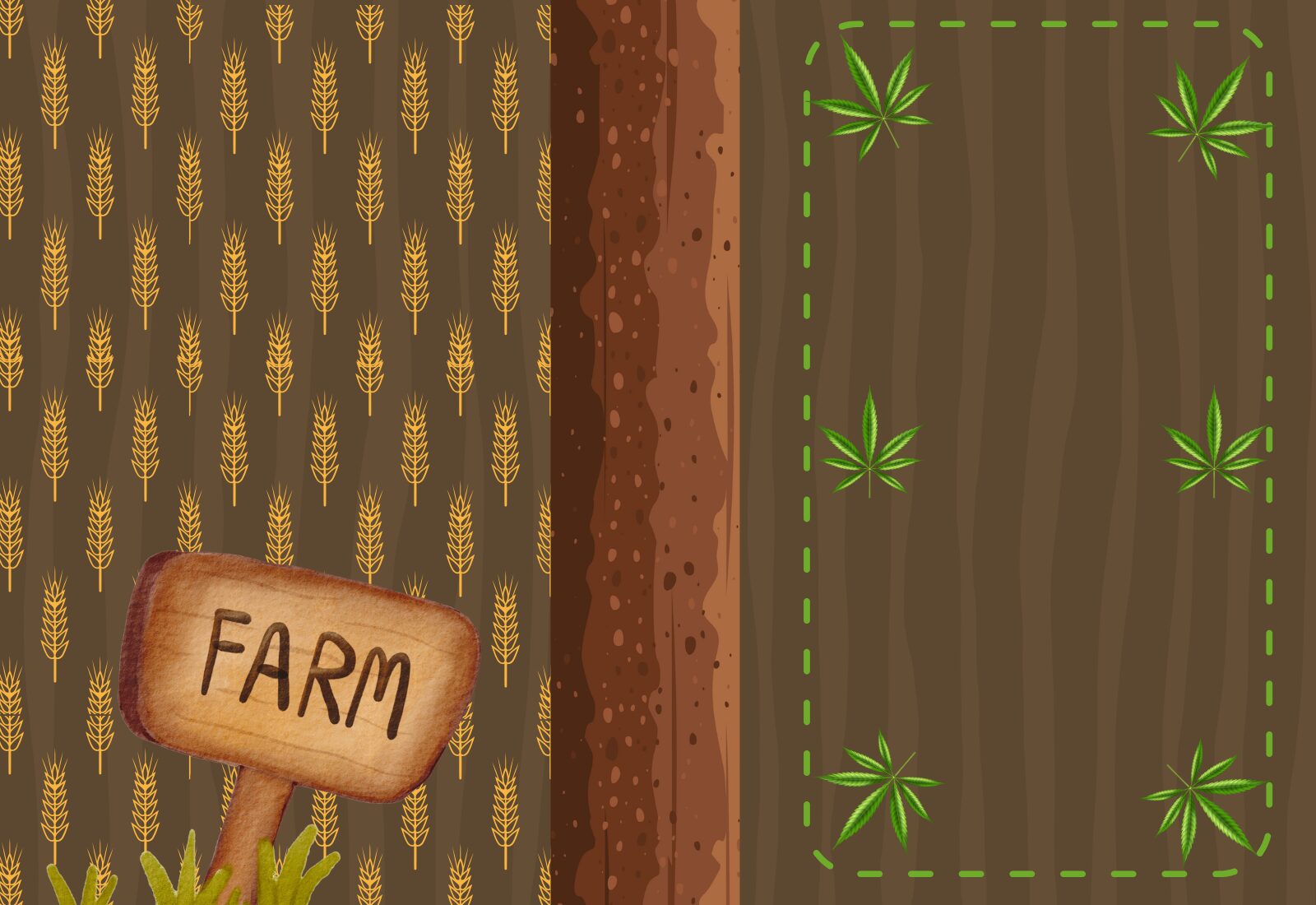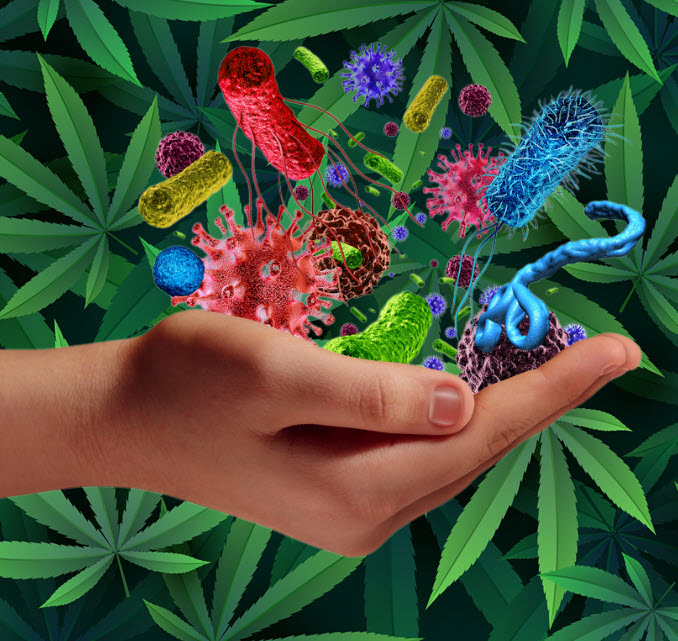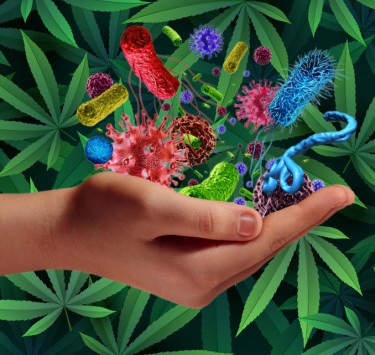Cannabis News
Life After AI – 10 Tips to Reinvent Yourself after AI Takes Your Job and Your Girlfriend
Published
5 months agoon
By
admin

Ganja Theory: What to do when Humans effort is replaced by AI?
In the ever-evolving landscape of technology and artificial intelligence, a recent episode of the Joe Rogan Experience featuring Billy Carson ignited a provocative discussion about the future of human labor. As AI continues to advance at an unprecedented pace, the podcast delved into a pressing question: What happens when artificial intelligence replaces all human effort?
Joe and Billy, in their freewheeling conversation, proposed an intriguing yet ultimately impractical solution: providing every adult with an annual stipend of $200,000. However, they quickly realized the astronomical cost of such a program—a staggering $40 trillion per year for the U.S. alone—rendering it economically unfeasible.
Nevertheless, this thought experiment raises a crucial issue that we, as a society, must grapple with: How do we address the potential redundancy of human labor in an AI-dominated world? When machines handle our construction needs, take over our physical tasks, and even encroach upon our creative and intellectual domains, what purpose will we serve? What will give our lives meaning and direction?
As we stand on the precipice of this technological revolution, it’s essential to explore the implications of a world where human effort is no longer a necessity. In this article, we’ll embark on a journey to uncover potential pathways for humanity in an AI-driven future. We’ll examine how we might redefine our roles, find new sources of fulfillment, and navigate the challenges and opportunities that lie ahead.
So, dear readers of the cannabis community, it’s time to settle in, light up your favorite strain, and open your minds to the possibilities. In this edition of Ganja Theory, we’re going to take a deep dive into the murky waters of a post-labor society and emerge with fresh perspectives on what it means to be human in an age of artificial intelligence.
Prepare yourselves for a mind-expanding exploration of human potential, societal transformation, and the redefinition of purpose in a world where we no longer “need” to do anything. Let’s embark on this intellectual odyssey together and uncover what the future might hold when AI takes the wheel.
In the face of AI’s potential to replace human labor, one of the most unsettling prospects for many is the loss of their sense of self-identity. When asked to introduce themselves, most people instinctively begin with their profession: “I’m a teacher,” “I’m a doctor,” or “I’m an engineer.” This reflexive response underscores how deeply our occupations are intertwined with our sense of purpose and self-worth.
But let’s pause for a moment and consider a profound question that mystics and philosophers have pondered for millennia: Are you your job, or do you simply have a job? This distinction is crucial as we navigate the uncertain waters of an AI-dominated future.
The truth is, you are not your job. Your occupation, while significant, is merely one facet of your existence. It’s a role you play, a hat you wear, but it doesn’t define the entirety of who you are. In fact, for many, their job may actually serve as a distraction from their true essence. Unless you’re one of the fortunate few who are genuinely passionate about their work, chances are you’re working primarily to survive rather than to fulfill your deepest aspirations.
This brings us to another vital question: Is mere survival truly living? The answer, quite simply, is no. Survival is about meeting basic needs, avoiding perishing. It’s a state of doing what’s necessary, not what’s fulfilling or aspirational. True living, on the other hand, involves striving for higher ideals, seeking personal growth, and finding meaning beyond mere existence.
As we face the prospect of AI rendering many traditional jobs obsolete, it’s crucial to shift our focus inward and ask ourselves: “What brings me joy? What gives me a sense of purpose?” These questions are not just philosophical musings but practical considerations that will determine how well we adapt to a changing world.
Purpose is the key differentiator between those who might struggle in an AI-driven future and those who will thrive. It’s the internal compass that guides us when external markers of success and identity are stripped away. Finding your purpose isn’t about discovering some grandiose mission; it’s about identifying what makes you feel alive, what drives you to get out of bed each morning with enthusiasm.
Even if you’re currently working in a job that doesn’t ignite your passion, now is the perfect time to start exploring what truly matters to you. What activities make you lose track of time? What causes or issues stir your emotions? What skills or talents do you possess that you’d love to develop further? These are the clues that can lead you to your purpose.
Remember, the impending AI revolution isn’t just a threat; it’s an opportunity. An opportunity to shed the constraints of survival-driven work and rediscover who you really are beneath the labels and roles society has assigned to you. By focusing on purpose now, you’ll be better equipped to navigate the changes ahead and find fulfillment in a world where traditional notions of work may no longer apply.
Purpose is often perceived as an elusive concept, something hidden that we must discover or uncover. However, it’s crucial to understand that purpose isn’t some divine mandate or external force acting upon us. Rather, it’s deeply personal and internal.
At its core, purpose is simply anything that gives you a compelling reason to get out of bed in the morning. It’s what drives you, what excites you, what makes you feel alive. True purpose is intrinsically motivating – you engage in it not because you have to, but because you want to. It’s something you’d do even if you weren’t paid for it.
Of course, in our current society, we all need money to survive. The ideal scenario is to find something you’re passionate about and then develop your skills to such a degree that people are willing to pay you for it. This intersection of passion and profession is the sweet spot many strive for.
But in a world increasingly dominated by AI, this equation becomes more complex. If artificial intelligence can potentially do everything, why would anyone pay for human labor or creativity? This is where we need to delve deeper into what makes us uniquely human.
While AI can indeed perform a vast array of tasks, it lacks a fundamental element that resonates with the human spirit – true originality. We’re already seeing the effects of this in the digital landscape. The proliferation of generic AI-generated content on platforms like YouTube and TikTok is leading to what we might call “AI fatigue.” The same voices, the same styles, repeated ad infinitum, create a backdrop of digital noise that increasingly fails to engage us on a deeper level.
In this context, anything that stands out as slightly different, that has a unique cadence or a deeper spiritual element, begins to capture our attention. It’s the human touch, the slight imperfections, the unexpected twists that make content truly engaging. This is where those with creativity and the ability to translate the deep longing of the soul into tangible expressions will have an edge in the AI-dominated future.
So, as you contemplate your purpose in this evolving landscape, ask yourself: In the field that I’m passionate about, how can I make my contribution original and unique? How can I differentiate my work from the static noise of AI-generated content? What aspects of my humanity – my experiences, my emotions, my unique perspective – can I infuse into my work to make it resonate on a deeper level with others?
This process of finding your unique voice and expressing it in a way that stands out amidst the sea of AI-generated content is the first true path to thriving in the AI future. It’s about embracing your humanity, with all its quirks and imperfections, and using that as your strength in a world of digital perfection.
Remember, while AI can replicate and even innovate, it cannot truly create in the same way humans do. Our creativity is born from our lived experiences, our emotions, our struggles, and our triumphs. This is what gives our creations depth and resonance. By tapping into this wellspring of human experience and expressing it in your chosen field, you can find a purpose that not only fulfills you but also provides value in an AI-dominated world.
While we can’t be certain about the inner experiences of AI, it’s clear that human suffering is a unique and powerful force. The very act of living as a human involves suffering and overcoming challenges. This experience, so intrinsic to our existence, sets us apart in a profound way from artificial intelligence.
Suffering, despite its negative connotations, is a key motivating force in human life. It drives us to grow, to change, to seek deeper understanding of ourselves and the world around us. When we face adversity and work through it, we emerge stronger, wiser, and often with valuable insights to share.
This process of overcoming suffering and transforming it into something meaningful is at the heart of much human creativity. Art, music, literature – many of our greatest cultural achievements have roots in personal or collective suffering. The artist who channels their pain into a moving painting, the musician who turns heartbreak into a touching melody, the author who weaves their life struggles into a compelling narrative – these are all examples of turning suffering into gold.
In your own life, your trials, setbacks, and challenges are not merely obstacles to be overcome. They are, in fact, golden nuggets embedded in the rock strata of your being. These experiences, though often painful, are uniquely yours. They shape your perspective, inform your understanding, and can become the raw material for profound personal growth and creative expression.
Your task, then, is to mine these experiences. Go inward, reflect on your challenges, and seek to understand them deeply. Then, work to refine these raw experiences, to extract their essence and transform them into something valuable – not just for yourself, but for others as well.
In an AI-dominated world, those who can perform this kind of emotional alchemy will likely become highly sought after. The ability to not only process and transmute personal pain, but to do so in a way that resonates with others and provides value, will be a uniquely human skill. With the vast array of tools and resources that AI can provide, these emotional alchemists will have unprecedented ability to turn their personal gold into widely accessible and impactful creations.
This process of transmuting suffering into something valuable is deeply personal and often challenging. It requires introspection, courage, and perseverance. But it’s also a profoundly human endeavor, one that AI, for all its capabilities, cannot truly replicate.
If all of this seems too abstract or philosophical, don’t worry. In our next segment, we’ll delve into more practical, concrete steps you can take to thrive in an AI-dominated world. But keep in mind that this ability to transform personal experiences, especially challenging ones, into something of value for others, may well be one of your greatest assets in the future.
While philosophical discussions about purpose and meaning are valuable, it’s equally important to consider practical steps you can take to prepare for an AI-dominated future. If you’re feeling anxious about this potential reality, here are some concrete actions you can start implementing today:
Identify Your Core Joy: Ask yourself, “What gives me absolute joy, regardless of payment?” This is crucial. Don’t focus on money or status; instead, think about what activities make you lose track of time and fill you with a sense of fulfillment.
Leverage Your Passions: Once you’ve identified what brings you joy, consider how you can turn it into a valuable offering. If you love fitness, how can you create a unique workout experience? If music is your passion, how can you compose or perform in a way that AI can’t replicate? If you enjoy working with your hands, remember that human-made artifacts may increase in value as mass-produced items become more homogenous.
Embrace Uniqueness: As AI drives down production costs, mass-produced items will become increasingly similar. In this landscape, human-made products with individual character will stand out. A table crafted by hand, with attention to every detail, will hold more value than one churned out by machines. Your unique human touch can become your selling point.
Shift from Consumer to Producer: In the AI economy, there will still be producers and consumers. Make a conscious effort to move from the consumer class to the producer class. What can you create? Whether it’s ideas, physical goods, or services, focus on producing rather than just consuming.
Identify Your Market: Even in an AI-dominated world, there will be buyers for unique, human-created products and services. Research and understand who these buyers might be for your particular offerings.
Embrace the Marketplace of Ideas: The future will likely be driven by ideas more than ever before. The good news is that AI will lower the barriers to entry for implementing these ideas. Focus on developing and refining your best ideas, as well as your ability to execute them effectively.
Start a Side Hustle: If you’re not ready to dive in fully, start small. Begin a side project in the area you’re passionate about. Use this as an opportunity to hone your skills, understand your market, and build a reputation.
Aim for Mastery: Whatever path you choose, strive to become exceptionally good at it. In a world where AI can do many things competently, human mastery will still stand out.
Stay Adaptable: The AI landscape will likely evolve rapidly. Be prepared to pivot and adapt your skills and offerings as needed.
Cultivate Human Connections: Despite AI advancements, human connections will remain valuable. Focus on building genuine relationships in your chosen field.
Remember, the goal is not to compete with AI on its terms, but to carve out a niche where your human qualities – creativity, empathy, and unique experiences – give you an edge. By focusing on what you love, producing rather than just consuming, and continually refining your skills, you can position yourself to thrive even as AI reshapes the job market.
Start taking these steps now, and you may find that when AI does become more dominant in the workforce, you’re already well-positioned to succeed in this new landscape. Your unique human touch, combined with the efficiency and capabilities of AI, could lead to opportunities you haven’t even imagined yet.
HUMAN HISTORY AND AI, READ ON…
WHAT IF THIS IS NOT THE FIRST TIME HUMANS USED AI? READ THIS!
You may like
-


4 Ways Marijuana Can Help You Have A Better Thanksgiving
-


Can Big Alcohol Help The Cannabis Industry
-


California Appeals Court Rejects Marijuana Grow Permit, Citing Federal Illegality
-


Expert Lighting Tips For Successful Indoor Growing Weed
-


Acne And CBD: Exploring Alternative Dermatological Solutions
-


Can I Gift Marijuana This Holiday Season?
Cannabis News
California Appeals Court Rejects Marijuana Grow Permit, Citing Federal Illegality
Published
6 hours agoon
November 22, 2024By
admin
In a landmark decision that highlights the tension between state and federal cannabis laws, a California appellate court ruled on October 29th that property owners can refuse to allow the transportation of cannabis across their land via easements, even when the cannabis operation is approved by local authorities.
The Second District Court of Appeal’s unanimous decision draws attention to private property rights in a context where cannabis remains federally illegal, but state law allows licensed cultivation, distribution and sale. Presiding Justice Albert Gilbert stated, “No matter how much California voters and the Legislature might try, cannabis cultivation and transportation are illegal in California as long as it remains illegal under federal law.” JCCrandall LLC v. County of Santa Barbara, Case No. B333201, 2024 WL 4599304, Oct. 29, 2024.
Unless the California Supreme Court grants review – which I would not rule out – the decision empowers private property owners to refuse to contract with cannabis businesses, and restricts local government from approving cannabis operations that implicate the property rights of neighbors who object.
The case at hand
The dispute centered around a cannabis cultivation operation in Santa Barbara County, where JCCrandall LLC challenged a conditional use permit granted by the County to its neighbor, Santa Rita Holdings Inc. The critical issue was that Santa Rita Holdings could only access its 2.5-acre cannabis farm via an unpaved road crossing JCCrandall’s property through a pre-existing easement. JCCrandall grows oats and barley.
JCCrandall’s primary concern? It raised a number of complaints with the Santa Barbara County Supervisors about truck traffic and night operations, which did not gain traction, but in the Court of Appeal JCCrandall focused on what it claimed was potential liability associated with having federally illegal substances transported across its property, even though County regulators found that the Santa Rita operation was fully compliant with state and local laws.
Key legal findings
The appellate court’s decision hinged on several crucial points:
- Property Rights: The court emphasized that “the right to exclude others is the essence of the right of property ownership” and classified it as a fundamental vested right.
- Federal Supremacy: The panel determined that allowing cannabis transportation across private property “defies the Supremacy Clause” of the U.S. Constitution.
- State vs. Federal Law: While cannabis might be legal under California law, the court ruled that federal law’s prohibition takes precedence in this context.
California cannabis industry implications
Legal experts suggest this ruling could have far-reaching consequences for California’s cannabis industry. Section 1550.5(b) of the California Civil Code makes contracts within California involving cannabis lawful and enforceable, and Santa Rita Holdings bet the ranch on that argument. But the Court of Appeal held that the statute could not compel a landowner to allow cannabis to travel across its property on a pre-existing easement. Licensed operators may find it harder to do business because neighbors who have property rights affected by a cannabis business can object, and, under the JCCrandall ruling, local government must yield to those objections.
An example might be a cannabis dispensary that depends on access to its parking lot via an easement or is located in a shopping center where other lessees have rights to object to tenants notwithstanding the approval of the landlord. In cultivation, many cannabis farms depend on vehicular access through easements because they are remote and do not always have direct access to public thoroughfares, or they depend on water sourced from other properties pursuant to agreements made by prior owners who grew traditional crops. These neighbors might not need to show any negative impact on their property, but can argue that they could be found complicit in federally illegal activities.
I think the most problematic language in the JCCrandall ruling is the following, which might draw the attention of the California Supreme Court and cause it to grant review: “For as long as an easement is enjoyed, its mode and manner of use shall remain substantially the same as it was at the time the easement was created. The County argues the easement was used for agricultural purposes. But there is a vast difference between legal and illegal agricultural purposes.” (Emphasis added.) If California has determined that cannabis cultivation is legal – as it has – and state courts routinely enforce contracts involving cannabis, it is a pretty bold step to declare the use of a lawful pre-existing easement illegal simply because the agricultural crop is cannabis and take away easement access from Santa Rita.
Looking ahead
This decision creates new challenges for cannabis businesses in California, and will result in more disputes among neighbors. While the Biden administration has shown signs of easing federal marijuana restrictions, this ruling demonstrates that the federal-state law conflict continues to create significant legal hurdles for the cannabis industry.
California court decisions also can be persuasive authority in other states, so we might see similar litigation (and decisions) elsewhere in the country where cannabis has been legalized.
The case serves as a reminder that despite California’s progressive stance on cannabis, federal prohibition continues to cast a long shadow over the industry’s operations and development. As the cannabis landscape continues to evolve, this ruling may prompt businesses to reassess their property arrangements and local governments will certainly have to reconsider their permitting processes to give more careful consideration to objections by neighbors who claim that their property rights are implicated by cannabis operations.
Note: This post was first published earlier this month on the Alger ADR Blog.
Cannabis News
Autoimmune Conditions Are Rising Fast in American Medicine, Can Cannabis Help?
Published
1 day agoon
November 21, 2024By
admin

Why Are Autoimmune Conditions On The Rise? And How Cannabis Can Help
Autoimmune diseases refer to a group of medical conditions that occur as a result of the immune system attacking your own tissues.
In a normal human body, the immune system is responsible for protecting the body by producing antibodies that prevent toxins, cancer cells, and viruses from harming the body. However, when one is struck by an autoimmune disorder, the immune system is no longer able to distinguish the difference between dangerous cells and healthy cells. As a result, the healthy cells are attacked, too.
Today, we know of around 100 different kinds of autoimmune conditions. Some of the most common examples of autoimmune conditions include rheumatoid arthritis (RA), lupus, inflammatory bowel disease, celiac disease, Type 1 diabetes, multiple sclerosis (MS), and the Guillain-Barre syndrome (GBS) to name a few. Others include Graves’ disease, Hashimoto’s thyroiditis, psoriasis, and vasculitis.
According to the National Health Council, around 50 million Americans are affected by autoimmune diseases today. This is a conservative estimate, considering that several autoimmune conditions are tricky to treat and so many people go undiagnosed for long periods of time. It’s worrisome to note that there are more people developing autoimmune diseases these days, many of which have reached levels comparable to epidemics.
But cannabis can help!
How Cannabis Can Help Curb And Manage Autoimmune Diseases
Not one single cause is responsible for the alarming growth of autoimmune diseases, though there are several factors at play. While there isn’t just one cause we can point at, it’s certain the reasons lie in our environment. After all, human genetics haven’t changed significantly yet the chemicals, toxins, and pollutants in our food and everyday items have risen dramatically.
In addition, people are getting less sleep than ever; stress rates are through the roof, and people are constantly worried. There is a clear link between psychological stress and physical health as well as immunity, which is why it isn’t unusual – it’s even common – to see many autoimmune disease cases flare up after people experience severe stress caused by grief, an accident, job loss, or the death of a loved one. These highly stressful and traumatic conditions wreak havoc on the body’s immune response, causing inflammation all over the body.
Conventional treatments prescribed to treat autoimmune conditions are focused on taming inflammation; these usually include steroids but also some non-steroidal drugs. These drugs often come with unwanted side effects, but research has shown that cannabis can work with the endocannabinoid system through THC and CBD, as well as other cannabinoids, to simulate similar results. In one study for example, we can see the clear association of the endocannabinoid system for neurodegenerative and inflammatory processes seen in Multiple Sclerosis and Amyotrophic Lateral Sclerosis.
There has also been an increasing number of studies proving the efficacy of cannabis for treating several autoimmune conditions.
Cannabis For Multiple Sclerosis
Multiple sclerosis is one of the autoimmune conditions where a growing number of studies have come out supporting the therapeutic benefits of cannabis for. In a 2024 study, patients with multiple sclerosis reported several improvements in quality of life after using cannabis-based medical products (CBMPs). For the study, British investigators analyzed the impact of cannabis based medicinal products made from either oil or extracts in 141 patients who were enrolled in the UK Medical Cannabis Registry.
The researchers then analyzed the changes in patient outcomes after a month, then three and 6 months after. According to the patients themselves, they were able to sustain improvements in their mental and physical health after marijuana therapy.
“This case series demonstrates a potential association between the initiation of CBMPs and improved patient reported outcomes in sleep, anxiety, and general HRQoL [health-related quality of life] measures, over six months,” said the study authors. “Additional measures for HRQoL, including various physical and mental health subdomains, also exhibit improvements up to six months when compared to baseline,” the authors concluded.
In another study from 2023, patients with multiple sclerosis reported significant improvements in symptoms after cannabis use. For the study, researchers from the Dent Neurologic Institute in Buffalo, New York, analyzed the medical records of 141 patients with multiple sclerosis, who were also legally authorized to consume medical marijuana products. They then analyzed data from the patients after one up to 4 follow-up sessions after the initial session of cannabis therapy. Sixty-five percent of patients consumed 1:1 THC:CBD tinctures.
According to the authors: “The results of this study indicate that use of MC [medical cannabis] to alleviate symptoms of MS is largely efficacious, with improvement in pain (72 percent of patients), muscle spasticity (48 percent of patients), and sleep disturbance (40 percent of patients) frequently reported.”
“More than half of opioid users at baseline were able to either discontinue or decrease their opioid use after starting MC. The mean daily MME [morphine milligram equivalents] was significantly reduced from the initial visit (51 mg) to the last follow-up visit (40 mg). This is consistent with previous literature showing that MC legalization is associated with decreased opioid use and that MC use is associated with decreased opioid use in patients with chronic pain. These findings indicate that MC may represent an alternative analgesic to opioids for some patients,” they wrote.
Anecdotal Evidence
While more studies are needed to determine cannabis’ effect on other autoimmune conditions such as rheumatoid arthritis, we can rely on anecdotal evidence. In 2020, data from the medical journal, Rheumatology, revealed that patients who have this condition, along with those who have lupus and fibromyalgia, consume cannabis.
In fact, it was reported that marijuana was extremely common especially for patients with fibromyalgia. “In this meta-analysis, we found that one in six patients suffering from rheumatologic disease actively consumes cannabis, reducing pain reduction… A favorable effect of cannabis on pain in our meta-analysis reinforces the idea that cannabis could be used for analgesic purposes,” the authors concluded.
Conclusion
Cannabis is a safe and natural way to help prevent and treat the symptoms of autoimmune disease. It targets inflammation at its root, and is a proven natural way to help cope with stress, pain, insomnia, and inflammation all while protecting the brain. However, it’s important to ensure you medicate with clean, organic sources of marijuana.
AUTOIMMUNE AND CANNABIS, READ ON…

The U.S. Senate’s version of the Farm Bill finally landed this week. They’re calling it the Rural Prosperity and Food Security Act of 2024 (the “Senate bill”). The Senate bill follows on the House’s proposal, called the Farm, Food and National Security Act of 2024 (the “House bill”), offered in May. Neither the Senate bill nor the House bill would preempt state or Indian law regarding hemp or the regulation of hemp products. This means states and tribes will retain a lot of latitude in regulating hemp and hemp-derived products– which gets people fired up.
Aside from giving states some runway, the Senate bill and the House bill differ in key respects regarding hemp. Therefore, these august bodies must confer and reconcile their sundry proposals. That could happen in 2024, but seems more likely in 2025 when the new Congress convenes. As of this week, though, we finally have a framework.
The Senate Bill re-defines “hemp” and defines “industrial hemp”
Section 10016 of the Senate bill (“Hemp Production”) amends the definition of “hemp.” Hemp was defined in the 2018 Farm Bill and removed from the federal Controlled Substances Act (CSA), taking us on a truly wild ride. See: What Happened to Hemp? (“What Happened”). The Senate bill also gives us a definition for “industrial hemp.” Here are those definitions, with points of emphasis in bold:
(1) Hemp. The term “hemp” means (A) the plant Cannabis sativa L. and any part of that plant, including the seeds thereof and all derivatives, extracts, cannabinoids, isomers, acids, salts, and salts of isomers, whether growing or not, with a delta-9 total tetrahydrocannabinol concentration (including tetrahydrocannabinolic acid) of not more than 0.3 percent on a dry weight basis; and (B) industrial hemp.
(3) Industrial Hemp. The term “industrial hemp” means the plant Cannabis sativa L. if the harvested material (A) is only (i) the stalks of that plant, fiber produced from those stalks, or any other manufactured product, derivative, mixture, or preparation of those stalks (except cannabinoid resin extracted from those stalks); (ii) whole grain, oil, cake, nut, hull, or any other compound, manufactured product, derivative, mixture, or preparation of the seeds of that plant (except cannabinoid resin extracted from the seeds of that plant); or (iii) viable seeds of that plant produced solely for production or manufacture of any material described in clause (i) or (ii); and (B) will not be used in the manufacturing or synthesis of natural or synthetic cannabinoid products.
The new regime
Again, the definitional stuff in bold is what I want to emphasize.
First, the Senate bill keeps the THC threshold at 0.3 percent, which is an arbitrary number we’ve been advocating against for years. The Senate bill mirrors the House bill in this respect, though, so we are stuck with this, unless Ron Paul gets his way.
Second, the Senate bill keeps the 2018 Farm Bill’s total THC standard, including THCA. The House bill does this too. This was fairly predictable: in What Happened, I wrote that we could “expect the total THC standard to remain, which means that actual Delta-9 THC won’t be the only metric for calculating THC content.”
We’ve also explained on this blog that the 2018 Farm Bill and USDA rules mandate total THC testing on pre-harvest hemp batches, but do not mandate such testing on post-harvest hemp or hemp products. The Senate bill doesn’t change this paradigm, which means the “loophole” for gas station weed remains open. This proposal is a big win for opponents of the House bill’s “Miller Amendment,” which would narrow the definition of “hemp” to exclude intoxicating hemp-derived substances.
Third, the Senate bill introduces a new definition and framework for industrial hemp. The House bill does this too, albeit slightly differently. The idea here is to invite farmers to grow hemp for fiber and grain purposes, while freeing them from regulatory burdens with the Department of Agriculture and criminal exposure with the Department of Justice. More specifically, for “industrial hemp” growers, the Senate bill:
- removes background check requirements;
- instates “relaxed regulatory requirements” for sampling and inspection methodologies (which will need to be adopted by rule); and
- develops a certified seed program.
The Senate bill also makes any hemp producer ineligible to grow hemp for five years if that producer, “with a culpable mental state greater than negligence, produces a crop of hemp that is inconsistent with that license.”(Hint: use the seed program.) The proof standard here seems like it could be an issue, and even if anyone has been adjudicated as growing marijuana under the guise of hemp, Farm Bill ineligibility seems like a far-off concern.
Bottom line
The big takeaway for me is that the Senate bill leaves the door open for intoxicating hemp products, whereas the Miller Amendment to the House bill does not. Something’s gotta give. And it needs to happen soon, because we’re already long overdue. As I explained in a webinar last week, the Farm Bill deals with the nation’s entire food supply, not just hemp. Therefore, this is not like with the SAFE Banking Act, where we have a proposed law specific to cannabis that may or may not ever pass. The Farm Bill must pass, and soon.
Stay tuned and we’ll keep you updated on any major happenings. For more on this topic, check out our massive hemp and CBD archive, or these specific, recent posts:

4 Ways Marijuana Can Help You Have A Better Thanksgiving

Can Big Alcohol Help The Cannabis Industry

California Appeals Court Rejects Marijuana Grow Permit, Citing Federal Illegality

Expert Lighting Tips For Successful Indoor Growing Weed

Acne And CBD: Exploring Alternative Dermatological Solutions

Can I Gift Marijuana This Holiday Season?

The Best Cocktails For An Easy Festive Thanksgiving

420 Vacations: Planning the Perfect Weed Vacation

Can Microdosing Help Manage Holiday Family Anxiety

11 Weed Shows and Movies on Netflix Worth Watching

Distressed Cannabis Business Takeaways – Canna Law Blog™

United States: Alex Malyshev And Melinda Fellner Discuss The Intersection Of Tax And Cannabis In New Video Series – Part VI: Licensing (Video)

What you Need to Know

Drug Testing for Marijuana – The Joint Blog

NCIA Write About Their Equity Scholarship Program

It has been a wild news week – here’s how CBD and weed can help you relax

Cannabis, alcohol firm SNDL loses CA$372.4 million in 2022

A new April 20 cannabis contest includes a $40,000 purse

Your Go-To Source for Cannabis Logos and Designs

UArizona launches online cannabis compliance online course
Trending
-

 Cannabis News2 years ago
Cannabis News2 years agoDistressed Cannabis Business Takeaways – Canna Law Blog™
-

 One-Hit Wonders2 years ago
One-Hit Wonders2 years agoUnited States: Alex Malyshev And Melinda Fellner Discuss The Intersection Of Tax And Cannabis In New Video Series – Part VI: Licensing (Video)
-

 Cannabis 1012 years ago
Cannabis 1012 years agoWhat you Need to Know
-

 drug testing11 months ago
drug testing11 months agoDrug Testing for Marijuana – The Joint Blog
-

 Education2 years ago
Education2 years agoNCIA Write About Their Equity Scholarship Program
-

 Cannabis2 years ago
Cannabis2 years agoIt has been a wild news week – here’s how CBD and weed can help you relax
-

 Marijuana Business Daily2 years ago
Marijuana Business Daily2 years agoCannabis, alcohol firm SNDL loses CA$372.4 million in 2022
-

 California2 years ago
California2 years agoA new April 20 cannabis contest includes a $40,000 purse





